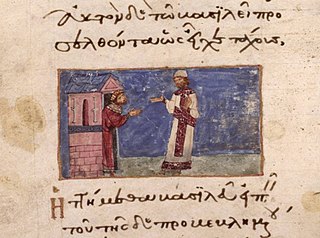Ursus is Latin for bear. It may also refer to:

Praefectus, often with a further qualification, was the formal title of many, fairly low to high-ranking, military or civil officials in the Roman Empire, whose authority was not embodied in their person but conferred by delegation from a higher authority. They did have some authority in their prefecture such as controlling prisons and in civil administration.
Bassus is a Latin adjective meaning "thick, fat, stumpy, short" and may refer to:
Aetius, Aëtius, or Aetios (Ἀέτιος) may refer to:

The praefectus urbanus, also called praefectus urbi or urban prefect in English, was prefect of the city of Rome, and later also of Constantinople. The office originated under the Roman kings, continued during the Republic and Empire, and held high importance in late Antiquity. The office survived the collapse of the Western Roman Empire, and the last urban prefect of Rome, named Iohannes, is attested in 599. In the East, in Constantinople, the office survived until the 13th century.
Adamantius or Adamantios may refer to:
Vettius Agorius Praetextatus was a wealthy pagan aristocrat in the 4th-century Roman Empire, and a high priest in the cults of numerous gods. He served as the praetorian prefect at the court of Emperor Valentinian II in 384 until his death that same year.
Marcian most often refers to Flavius Marcianus, Eastern Roman emperor from 450 to 457 AD
Theodotus is the name of:
Hilarius is the given name of:
The gens Anicia was a plebeian family at ancient Rome, mentioned first towards the end of the fourth century BC. The first of the Anicii to achieve prominence under the Republic was Lucius Anicius Gallus, who conducted the war against the Illyrians during the Third Macedonian War, in 168 BC.
Flavius Monaxius was a politician of the Eastern Roman Empire, praefectus urbi of Constantinople, Consul and twice praetorian prefect of the East.
Aurelianus was a prominent politician of the Eastern Roman Empire. He was praefectus urbi of Constantinople from 393 to 394, Praetorian prefect of the East from 399 to 400, and consul in 400. In 400, Gothic rebels under Gainas forced the emperor Arcadius to give them Aurelianus, and he was exiled; he returned to Constantinople after the defeat of the Goths later that year. He served as Pretorian Prefect to the East a second time from 414 to 416.

Domitius Modestus was a politician of the Roman Empire. He held appointments under the emperors Constantius II, Julian, and Valens, and was consul in 372. Previously a pagan, he converted to Arianism under Valens, and was sent by Valens to mediate between the Arian and Nicene factions with Basil of Caesarea.
Aetius was a politician of the Eastern Roman Empire, praefectus urbi of Constantinople and praetorian prefect of the East.
Prefect is a magisterial title of varying definition, but which, basically, refers to the leader of an administrative area. It may also refer to:
The gens Rufia, occasionally spelled Ruffia, was a minor plebeian family at ancient Rome. Members of this gens are not mentioned in history until imperial times, and they achieved little prominence until the late third century, from which time the family rose in importance, gaining the consulship on a number of occasions from the time of Constantine the Great to that of Justinian, and frequently holding the post of praefectus urbi.
This page is based on this
Wikipedia article Text is available under the
CC BY-SA 4.0 license; additional terms may apply.
Images, videos and audio are available under their respective licenses.

